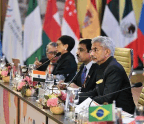ONE FOR THE HISTORY BOOKS


ON 26 MARCH THIS YEAR, at a feminist webinar to mark fifty years since Bangladesh gained independence, the Pakistani author and oral historian Anam Zakaria spoke about the “political and cultural silencing around the birth of Bangladesh” that she witnessed around her while growing up. She clarified that this was not a “complete erasure” of 1971, which “remains one of the most defining years in Pakistan’s history and the national imagination,” with a lasting effect on education, policy-making, perceptions of neighbouring countries and so on. “But what is remembered about ’71 also in many ways determines what must not be remembered,” she continued. In her research, where she draws on textbooks, museum exhibits and military memoirs, she analyses techniques of official history-making and the dissemination of “fabricated narratives” regarding the war.
In late 1971, India participated in Bangladesh’s Liberation War against Pakistan, alongside the Mukti Bahini forces—Bangladeshi freedom fighters. For Bangladesh, which won its sovereignty on 16 December that year, it was a historic event that led to the realisation of its long-sought dreams of independence. For India, it was a brilliant triumph over its arch-enemy, Pakistan. And for Pakistan, it was another Indian attempt to destabilise its polity. Indeed, in historical or political discourse outside Bangladesh, the significance of the war is often subsumed within the overarching narrative of enmity between India and Pakistan—1971 becomes just another blotch on the relationship shared by these two countries. But for Bangladesh, 1971 is a matter of pride and national fervour, though it also carries with it a sense of unrelenting trauma.
With the fiftieth anniversary of the birth of Bangladesh this year, it is worth revisiting how the memory of 1971 has acquired different shapes in these countries. Zakaria’s , published in late 2019, seeks to shed light on the multiple ways in which and Srinath Raghavan’s , two examinations of that landmark year, demonstrate that it is the shadow of the Cold War that defines international memories of it.
You’re reading a preview, subscribe to read more.
Start your free 30 days





